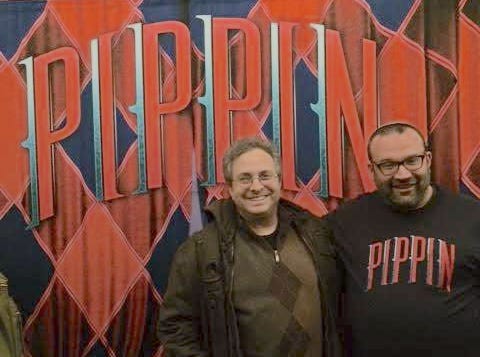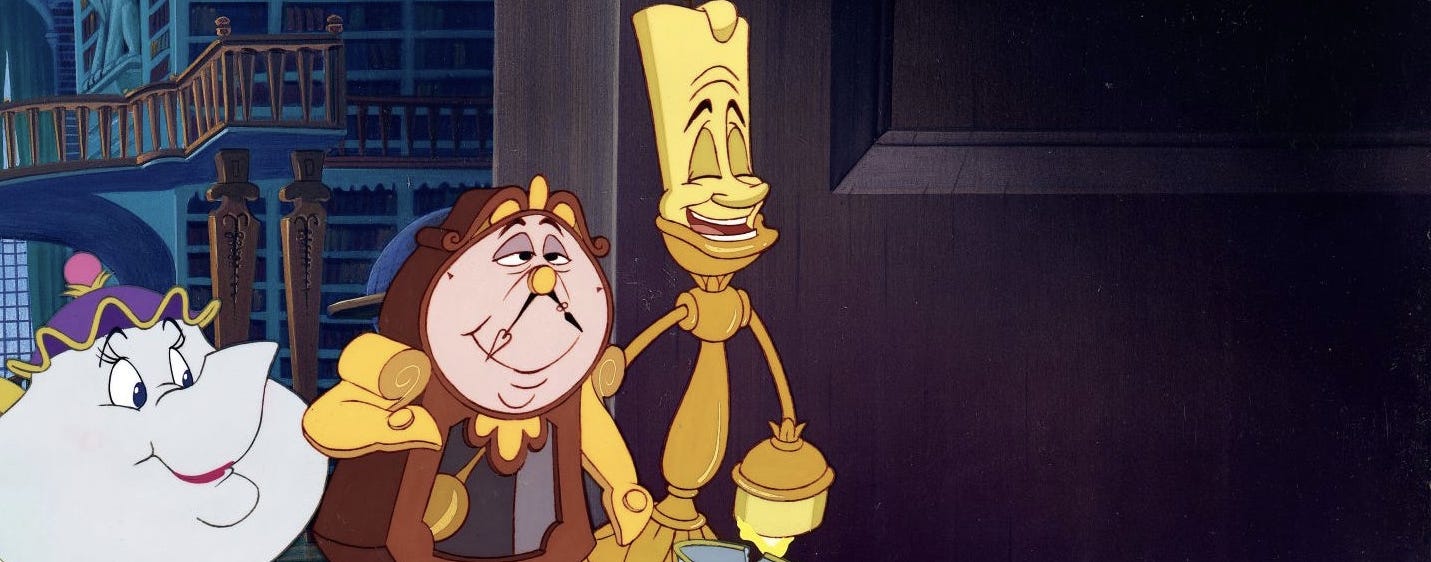Jewish-Adjacent Voice Actors Angela Lansbury, David Ogden Stiers, and Jerry Orbach
The Broadway Maven (David Benkof) interprets Broadway
There are only three more FREE inaugural issues of The Broadway Maven’s Weekly Blast, which after March 1 will be free only once a month. Inaugural subscribers by the March 8 debut of the weekly paid Blast will get 25 percent off FOREVER (that’s $27 instead of $36.) Press here:
Shalom!
This week, the Broadway Maven Looks at Jewish Voice Actors:
• The Thursday, February 11 class at Noon ET will talk about Mel Blanc, June Foray, and some of the other Jewish voice actors who made characters like Bugs Bunny, Rocky the Flying Squirrel, and Boris Badenov thrill young viewers. Sign up: bitly.com/BenkofVA
• I’ve uploaded a video to my YouTube channel that we’ll use in class with many examples of Jewish voice acting.
• This Weekly Blast looks at three extraordinary gentile vocal performers with Jewish connections; RANTS about an easily fix-able but important flaw in the Tony broadcasts; RAVES about a short online comedic play on Zoom gatherings; and links to a fan video YouTube GEM of Biblical proportions.
Sticking with last issue’s attention to Beauty and the Beast, and given this Thursday’s class on Jewish Voice Actors, this Weekly Blast looks at the trio of actors with long Broadway careers who provided the pitch-perfect voices for the magical household items in the animated version of the Ashman/Menken musical comedy. All are Jewish-adjacent in some way.
• Angela Lansbury (Mrs. Potts the teakettle) is one of the grandes dames of the American theater. At age 95, the four-time Tony winner has worked in the theater through the start of COVID, performing in a one-night benefit in November 2019. Her star turns in Mame, Gypsy, and Sweeney Todd have become iconic - and in fact she’s considered one of the biggest gay icons alive today. Though Lansbury is affiliated with Episcopal Christianity, her father’s first wife Minnie (née Glassman) was a prominent Jewish suffragette.
• David Ogden Stiers (Cogsworth the pendulum clock) played an alcoholic magician named “Feldman” for several years in the 1970s smash Broadway hit The Magic Show. Despite music by Stephen Schwartz (Pippin, Wicked) it is rarely revived (probably because the show was largely a vehicle for illusionist Doug Henning). Magic Show also has a character named Goldfarb as part of a magical-assistant plot. Stiers, who had a long list of voiceover credits, died in 2018.
• Jerry Orbach (Lumière the candelabra) was described by The New York Times “one of the last bona fide leading men of the Broadway musical.” Well-loved for singing “Try to Remember” as the Narrator of The Fantasticks and ribbing a young chorine with her city of origin “Allentown?” in 42nd Street, Orbach was nominated for three Tonys, winning one. He was a practicing Catholic, but his father was a German Jewish immigrant of Sephardi extraction. Orbach died in 2004.
Sign up for Thursday’s “Jewish Voice Actors” class here.
Watch this video reel of Jewish Voice actors performing some of their signature roles. Ask yourself, which performer is most talented, and why?
Then, put your answers below the video on YouTube.
Among the major awards shows, the Tonys represent an art form and industry unusually inaccessible to most telecast viewers. And the ratings often reflect that.
One reason, I think, is how the show’s aloof producers focus on what people in the auditorium or in the broader industry think and not about potential theatregoers at home - who are after all a captive audience for a hard sell on the magic of Broadway.
So for example, the camera - dozens of times - shows reactions by audience members with a connection to the name being cited. Example: if the host says “Hello, Dolly!” the audience member might be Bette Midler. If the host says “Lin,” the audience member might be Lin-Manuel Miranda.
Broadwayniks know lots of Broadway stars – and their significance – by sight. Most Tony viewers and potential ticket purchasers do not. Given the sophistication of facial recognition and other technology, the broadcast could easily display “Bette Midler, former star of Hello Dolly!” and “Lin-Manuel Miranda, creator of Hamilton.”
Another example: when award shows do “In Memoriam,” and audience members applaud an amount commensurate with the in-industry fame of the obscure-to-most-people names, it sends a message, “You don’t know who this person is? Rube.” Let the names scroll on the screen for 30 seconds or skip the exercise altogether - and use the extra time to give viewers more welcoming exposures to the great shows then-running on Broadway.
Broadway hasn’t, of course, disappeared under COVID. In fact, the virus itself has sparked creativity among some of the industry’s talent. My favorite is a 10-minute funny but reflective take on Zoom and similar platforms called Leave Meeting, written by my friend Murray Horwitz (who won a Tony for Ain’t Misbehavin’).
It’s a four-character Zoom conversation between a father, his wife, his son, and the son’s girlfriend about how communication changes under Zoom. The girlfriend sees advantages, but the stepmother hates “phony” Zoom chats, and performs a hilarious 90-second soliloquy (starting at 5:41) complaining about stilted Zoom conversations.
Her take on webcams: “If I look right at you, I can’t see you. And if I watch you, I’m not looking at you. You see what I’m saying? What is that doing to us? It’s not natural!”
Watch the whole thing at this link (Facebook required).
Here, more than 100 fans of The Prince of Egypt (pre-COVID, it was playing on the West End) sing “When You Believe,” stay-at-home style. The diversity is delightful - there are singers of every ethnicity, and at least one with intellectual disabilities and a (deaf?) fan who sings/signs in ASL. For me as a Jewish Broadwaynik, hearing the performers (clearly a mix of Jews and non-Jews), break into the Hebrew prayer “Mi Chamocha,” was simply enthralling.
Want to simplify things and gain access to great extra content? A $59 First Semester 2021 All-Access Pass gets you admission to all classes free or paid, including those that are full, plus the Weekly Blast and admission to exclusive bonus monthly classes. Tentatively planned all-new bonus classes include “The Wizard of Oz,” “MORE Sondheim’s Lyrics,” and “Fiddler on the Roof.” Passes only on sale through March 31. Register: bitly.com/BenkofFirst
Check Out:
One-minute video introduction to the course (please share widely!)
“Broadway Maven” playlist at YouTube
David Benkof’s YouTube channel
Next Eight Classes:
Thursday, February 11 Jewish Voice Actors (Noon ET)
Wednesday, February 17 Mel Brooks parts one AND two (8 to 10 pm ET)
Thursday, February 18 Roy Lichtenstein (Noon ET)
Tuesday, February 23 The Wizard of Oz (Noon ET, ALL-ACCESS Passholders ONLY)
Thursday, February 25 Schoolhouse Rock (Noon ET)
Monday, March 1 A Chorus Line (Noon and 8 pm ET); repeated Thursday 8 pm
Wednesday, March 3 West Side Story (8 pm ET, sign-ups soon)
Thursday, March 4 Simon & Garfunkel (Noon ET, sign-ups soon)
-David Benkof, The Broadway Maven

The Broadway Maven’s Weekly Blast is $5 a month or $36 a year. The newsletter is FREE weekly until March 1, and then FREE once a month thereafter. Become an Inaugural Subscriber during the free period and get 25% off PERMANENTLY by pressing this red button by March 8:











